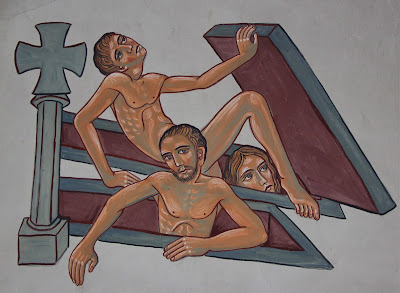“I believe in the resurrection of the body.”
November 10 2019: Thirty-second Sunday in Ordinary Time - C
An Arabic proverb says, “A horse which is tamed at forty is
only good for resurrection day.”
“I believe in the resurrection of the body,” proclaims
Catholics in the Creed. An act of faith that raises many misunderstandings. It
is in fact what distinguishes Christianity and especially Catholicism from many
other religions. By our belief in the resurrection, we profess that to die with
Christ is to live.
The Catechism of the Catholic Church states, “Because of
Christ, Christian death has a positive meaning: "For to me to live is
Christ, and to die is gain" (Phil 1:21.) "The saying is sure: if we
have died with him, we will also live with him (2 Tim 2:11). What is
essentially new about Christian death is this: through Baptism, the Christian
has already "died with Christ" sacramentally, in order to live a new
life; and if we die in Christ's grace, physical death completes this
"dying with Christ" and so completes our incorporation into him in
his redeeming act” CCC. 1010.
To be Christian is before all, to believe in the
resurrection. We talk not only of the resurrection of Christ, the center of our
faith, but also of our own and personal future resurrection. Death bears no
longer the sense of fatality, neither does it constitute an end. It is rather,
a step towards life. Thus, the beautiful words of St. Theresa of the Child
Jesus, “I am not dying, I am entering into Life.”
Today’s liturgy, while we are getting closer to the end of
the Liturgical Year, is a proclamation of our belief in the resurrection. In
the Old Testament, the Book of the Maccabees, called also the Book of the
Martyrs of Israel, is known to be the greatest expression of that belief. We
read from it that the deaths of some people serve a larger redemptive purpose.
In our today’s first reading, from the second Maccabees, we
have narrated, the experience of seven brothers with their mother who were
arrested and tortured to death because of their refusal to give into idolatry
and transgress the Law of God. One of them, “at the point of death he said: ‘You
accursed fiend, you are depriving us of this present life, but the King of the
world will raise us up to live again forever. It is for his laws that we are
dying.’” From the last one we read, “It is my choice to die at the hands of men
with the hope God gives of being raised up by him; but for you, there will be
no resurrection to life.”
Here is a clear proclamation that God, who holds each one of
us life into his hands, will not forsake those who believe in him. He will
raise them up to new life, even after their death. The resurrection is the
hereditary share of the righteous and faithful to God’s Law.
Our God is not the God of the dead, but of the living.
Trusting in him, we know that our life does not end into the physical cessation
of life called death. It asks for a great faith and courage to reach that
affirmation. So, the exhortation of Paul to the Thessalonians in the second
reading, “May the Lord direct your hearts to the love of God and to the
endurance of Christ.” Jesus in the Gospel strengthens in us the faith in the
resurrection, through his answer to the Sadducees. The Lord utters, God “is not
God of the dead, but of the living, for to him all are alive.” God, actually,
has created mankind for life, not for death. The corruptible body will one day,
certainly, return into corruption. But that won’t be the end for us. Life does
not end into death.
These words are hard to pronounce, and harder to believe,
when we lose a loved one. In front of the death, we feel that our faith is put into
trial. The question always asked when confronted to death is: 'Why?' We seem
asking to God, why do we have to suffer death? But then, after the tears, we
come to reason, and we realize that, it calls for the courage of faith and the
presence of the Spirit of God, to hold on what we profess: “I believe in the
resurrection of the body, and life everlasting…” The everlasting life, however,
is not here on this earth. Therefore, if one wants the paradise, he must first
let go the mortal body. We cannot go to God without dying. Without a doubt,
there is a resurrection of the dead and a life which will have no end. But the only
condition to rise to that new life is faith.
It is, however regrettable that today, many
people live as if there was nothing else after this present life. Many have erected
dwelling in drug, sex, alcohol and all kind of pleasure at any cost. Abundance
and bottomlessness of joy in the present, that is the motto of some people. They
say, “all that we have is the present, HIC ET NUNC.” With this philosophy, they
believe not in tomorrow, nor in a forever. For them, there is no forever. The faith
in the resurrection is a correction to the HIC ET NUNC philosophy. Jesus teaches
us that there is a forever for he who lives in him. Faith in the resurrection
is a motive of hope for us.





Comments
Post a Comment